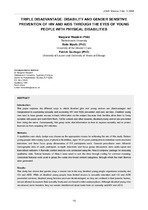| dc.contributor.author | Wazakili, Margaret | |
| dc.contributor.author | Mpofu, Ratie | |
| dc.contributor.author | Devlieger, Patrick | |
| dc.date.accessioned | 2017-05-03T07:09:40Z | |
| dc.date.available | 2017-05-03T07:09:40Z | |
| dc.date.issued | 2008 | |
| dc.identifier.citation | Wazakili, M. et al. (2008). Triple disadvantage: disability and gender sensitive prevention of HIV and aids through the eyes of young People with physical disabilities. Journal of Community & Health Sciences, 3(2): 11-21 | en_US |
| dc.identifier.issn | 1990-9403 | |
| dc.identifier.uri | http://hdl.handle.net/10566/2780 | |
| dc.identifier.uri | http://jchs.epubs.ac.za/index.php/jchs/article/view/36/31 | |
| dc.description.abstract | This paper explores the different ways in which disabled girls and young women are disadvantaged and marginalised in expressing sexuality and accessing HIV and AIDS prevention and care services. Disabled young men tend to have greater access to basic information on the subject because their families allow them to freely socialise with peers and learn from them. Yet for cultural and other reasons, disabled young women are prevented from doing the same. Consequently, this group lacks vital information on how to express sexuality and to protect themselves from acquiring HIV infection. | en_US |
| dc.language.iso | en | en_US |
| dc.publisher | University of the Western Cape | en_US |
| dc.rights | This journal provides immediate open access to its content on the principle that making research freely available to the public supports a greater global exchange of knowledge. | |
| dc.subject | Gender | en_US |
| dc.subject | Disabled youth | en_US |
| dc.subject | Prevention | en_US |
| dc.subject | HIV/AIDS | en_US |
| dc.subject | Disadvantage | en_US |
| dc.subject | Nyanga | en_US |
| dc.title | Triple disadvantage: disability and gender sensitive prevention of HIV and aids through the eyes of young people with physical disabilities | en_US |
| dc.type | Article | en_US |
| dc.privacy.showsubmitter | FALSE | |
| dc.status.ispeerreviewed | TRUE | |

